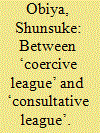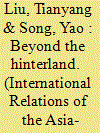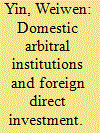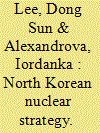|
|
|
Sort Order |
|
|
|
Items / Page
|
|
|
|
|
|
|
| Srl | Item |
| 1 |
ID:
186181


|
|
|
|
|
| Summary/Abstract |
This article addresses debates surrounding the reform of the League of Nations from the viewpoint of Britain and China. They focused on the pros and cons of collective security because the failure of the League to stop Japanese invasion of Manchuria and Italian invasion of Abyssinia threatened the collapse of the League. There were two contrasting visions in debates, the ‘Coercive League’ and the ‘Consultative League’. The ‘Coercive League’ was the course to reinforce collective security to prevent further aggression. Conversely, the ‘Consultative League’ argument was to weaken collective security and induce Germany, Italy, and Japan to cooperate with the League. Deliberations took place in both the Council, in which great powers exerted a strong presence, and the Assembly, in which small powers made their voices heard. Therefore, this article deals with Britain as an example of a great power and China as one of a small power.
|
|
|
|
|
|
|
|
|
|
|
|
|
|
|
|
| 2 |
ID:
186177


|
|
|
|
|
| Summary/Abstract |
The scholarly literature on paradiplomacy has tended to focus overly on subnational governments in federal systems rather than those in unitary and centralized countries. However, it is important to note that some subnational governments in these countries have been increasingly proactive in international relations (IR). This study explores the paradiplomatic activities of Yunnan, a province in the south of China which, since the early 1990s, has actively engaged in cross-border cooperation. Combining the concept of paradiplomacy with the theory of actorness, this study first argues that Yunnan has been incentivized to conduct paradiplomacy through the decision of Beijing to open China’s borders; the inefficiency of the central government in managing border-related issues; and the interprovincial competition over economic and diplomatic clouts in the Mekong subregion. Second, this study argues that Yunnan’s new external affairs powers have been consolidated by a host of new opportunities stemming from the external environment. Third, it argues that Yunnan’s new external affairs powers have enabled it to leverage two broad instruments (infrastructure development and economic statecraft) to make neighboring countries more dependent on cooperation with it. And finally, it is argued that Yunnan’s role as an IR player has been acknowledged both by neighboring countries and by Beijing.
|
|
|
|
|
|
|
|
|
|
|
|
|
|
|
|
| 3 |
ID:
186179


|
|
|
|
|
| Summary/Abstract |
Existing literature focuses on how domestic and international institutions address investor–state disputes and attract foreign direct investment (FDI). However, contractual disputes between foreign and domestic firms are largely neglected. For foreign investors, dispute resolution mechanisms that can effectively resolve contractual disputes are very important as well. In this article, I examine the effect of institutions that conduct arbitrations for disputes between foreign and domestic firms on FDI inflows. Focusing on the within-country variation of China, I find that provinces with CIETAC (China International Economic and Trade Arbitration Commission) agencies receive a higher level of FDI. These agencies attract FDI because they can credibly signal that local governments are truly willing to treat foreign investors fairly when they have disputes with local firms. In sum, this article highlights an institutional variable that has received little attention in the literature on the politics of FDI.
|
|
|
|
|
|
|
|
|
|
|
|
|
|
|
|
| 4 |
ID:
186178


|
|
|
|
|
| Summary/Abstract |
What nuclear strategy has North Korea adopted? What factors have driven the development of this nuclear strategy? This article examines the key attributes of Pyongyang’s nuclear program to offer possible answers to these questions of scholarly and practical importance. It argues that North Korea has likely adopted an assured retaliation strategy, threatening a nuclear second strike to deter US nuclear attacks. This strategy was chosen due to its superior feasibility and desirability: it requires only a modest cost-effective nuclear arsenal, reduces Pyongyang’s security dependence on Beijing, permits politically safe centralized control over the nuclear weapons, and is also relatively economical. This article calls into question the common views that North Korea has employed a catalytic strategy using its nuclear capabilities to induce China’s assistance, and that Pyongyang is developing an asymmetric escalation strategy or a brinkmanship strategy, which utilizes nuclear weapons primarily to counter the superior conventional forces of its adversaries.
|
|
|
|
|
|
|
|
|
|
|
|
|
|
|
|
| 5 |
ID:
186180


|
|
|
|
|
| Summary/Abstract |
Since the end of the Cold War, establishing partnerships has been part and parcel of the grand strategy of great powers. The partners that great powers seek fall under the two categories of security partners and political-economic partners. Statistics show a significant variation in the proportions of great powers’ security partners. The authors argue that such variation is mainly determined by two factors, namely, great powers’ strategic threats, and their ways of maintaining national security [self-help or security-dependent (on the United States)]. Specifically, both the security-dependent great powers that are under China’s strategic threat and the self-help great powers that are under the US’s strategic threat have a higher proportion of security partners than the security-dependent great powers that are not under China’s strategic threat and the self-help great powers that are under China’s strategic threat. These findings will help to refine the current theories of great power politics.
|
|
|
|
|
|
|
|
|
|
|
|
|
|
|
|
|
|
|
|
|